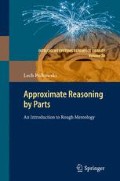Abstract
A scheme of mereology, introduced into a collection of objects, see Ch. 5, sets an exact hierarchy of objects of which some are (exact) parts of others; to ascertain whether an object is an exact part of some other object is in practical cases often difficult if possible at all, e.g., a robot sensing the environment by means of a camera or a laser range sensor, cannot exactly perceive obstacles or navigation beacons. Such evaluation can be done approximately only and one can discuss such situations up to a degree of certainty only. Thus, one departs from the exact reasoning scheme given by decomposition into parts to a scheme which approximates the exact scheme but does not observe it exactly.
Access this chapter
Tax calculation will be finalised at checkout
Purchases are for personal use only
Preview
Unable to display preview. Download preview PDF.
References
Van Benthem, J.: The Logic of Time. Reidel, Dordrecht (1983)
Faucett, W.M.: Compact semigroups irreducibly connected between two idempotents. Proc. Amer. Math.Soc. 6, 741–747 (1955)
Hájek, P.: Metamathematics of Fuzzy Logic. Kluwer, Dordrecht (1998)
Klösgen, W., Zytkow, J. (eds.): Handbook of Data Mining and Knowledge Discovery. Oxford University Press, Oxford (2002)
Kolmogorov, A.N.: On the representation of continuous functions of many variables by superposition of continuous functions of one variable and addition. Amer. Math.Soc. Transl. 28, 55–59 (1963)
Ling, C.–H.: Representation of associative functions. Publ. Math. Debrecen 12, 189–212 (1965)
Mostert, P.S., Shields, A.L.: On the structure of semigroups on a compact manifold with a boundary. Ann. Math. 65, 117–143 (1957)
Ośmiałowski, P.: On path planning for mobile robots: Introducing the mereological potential field method in the framework of mereological spatial reasoning. Journal of Automation, Mobile Robotics and Intelligent Systems (JAMRIS) 3(2), 1–10 (2009)
Poincaré, H.: La Science et l’Hypothése. Flammarion, Paris (1902)
Polkowski, L.: Rough Sets. Mathematical Foundations. Physica Verlag, Heidelberg (2002)
Polkowski, L.: A rough set paradigm for unifying rough set theory and fuzzy set theory. In: Wang, G., Liu, Q., Yao, Y., Skowron, A. (eds.) RSFDGrC 2003. LNCS (LNAI), vol. 2639, pp. 70–78. Springer, Heidelberg (2003)
Polkowski, L.: Toward rough set foundations. Mereological approach. In: Tsumoto, S., Słowiński, R., Komorowski, J., Grzymała-Busse, J.W. (eds.) RSCTC 2004. LNCS (LNAI), vol. 3066, pp. 8–25. Springer, Heidelberg (2004)
Polkowski, L.: Formal granular calculi based on rough inclusions. In: Proceedings of IEEE 2005 Conference on Granular Computing GrC 2005, pp. 57–62. IEEE Press, Beijing (2005)
Polkowski, L.: Rough–fuzzy–neurocomputing based on rough mereological calculus of granules. International Journal of Hybrid Intelligent Systems 2, 91–108 (2005)
Polkowski, L.: A model of granular computing with applications. In: Proceedings of IEEE 2006 Conference on Granular Computing GrC 2006, pp. 9–16. IEEE Computer Society Press, Atlanta (2006)
Polkowski, L.: Ośmiałowski P. Spatial reasoning with applications to mobile robotics. In: Xing–Jian, J. (ed.) Motion Planning for Mobile Robots: New Advances, InTech, Vienna, pp. 433–453 (2008)
Polkowski, L., Ośmiałowski, P.: Navigation for mobile autonomous robots and their formations: An application of spatial reasoning induced from rough mereological geometry. In: Barrera, A. (ed.) Mobile Robots Navigation. I–Tech, Zagreb, pp. 329–354 (2010)
Polkowski, L., Skowron, A.: Rough mereology. In: Raś, Z.W., Zemankova, M. (eds.) ISMIS 1994. LNCS, vol. 869, pp. 85–94. Springer, Heidelberg (1994)
Polkowski, L., Skowron, A.: Rough mereology: a new paradigm for approximate reasoning. International Journal of Approximate Reasoning 15(4), 333–365 (1997)
Polkowski, L., Skowron, A.: Rough mereology in information systems with applications to qualitative spatial reasoning. Fundamenta Informaticae 43, 291–320 (2000)
Polkowski, L., Szmigielski, A.: Computing with words via rough mereology in mobile robot navigation. In: Proceedings 2003 IEEE/RSJ Int. Conf. Intell. Robots and Systems IROS 2003, pp. 3498–3503. IEEE Press, Los Alamitos (2003)
Szmigielski, A.: A description based on rough mereology of the workspace of a mobile robot by means of a system of ultrasound sensors (in Polish). L. Polkowski (supervisor). PhD Dissertation. Dept. Electronics and Computer Techniques, Warsaw University of Technology (2003)
Tarski, A.: What is elementary geometry? In: Henkin, L., Suppes, P., Tarski, A. (eds.) The Axiomatic Method with Special Reference to Geometry and Physics, pp. 16–29. North-Holland, Amsterdam (1959)
Zadeh, L.A.: Fuzzy sets. Information and Control 8, 338–353 (1965)
Zadeh, L.A.: Similarity relations and fuzzy orderings. Information Sciences 3, 177–200 (1971)
Rights and permissions
Copyright information
© 2011 Springer-Verlag Berlin Heidelberg
About this paper
Cite this paper
Polkowski, L. (2011). Rough Mereology. In: Approximate Reasoning by Parts. Intelligent Systems Reference Library, vol 20. Springer, Berlin, Heidelberg. https://doi.org/10.1007/978-3-642-22279-5_6
Download citation
DOI: https://doi.org/10.1007/978-3-642-22279-5_6
Publisher Name: Springer, Berlin, Heidelberg
Print ISBN: 978-3-642-22278-8
Online ISBN: 978-3-642-22279-5
eBook Packages: EngineeringEngineering (R0)

